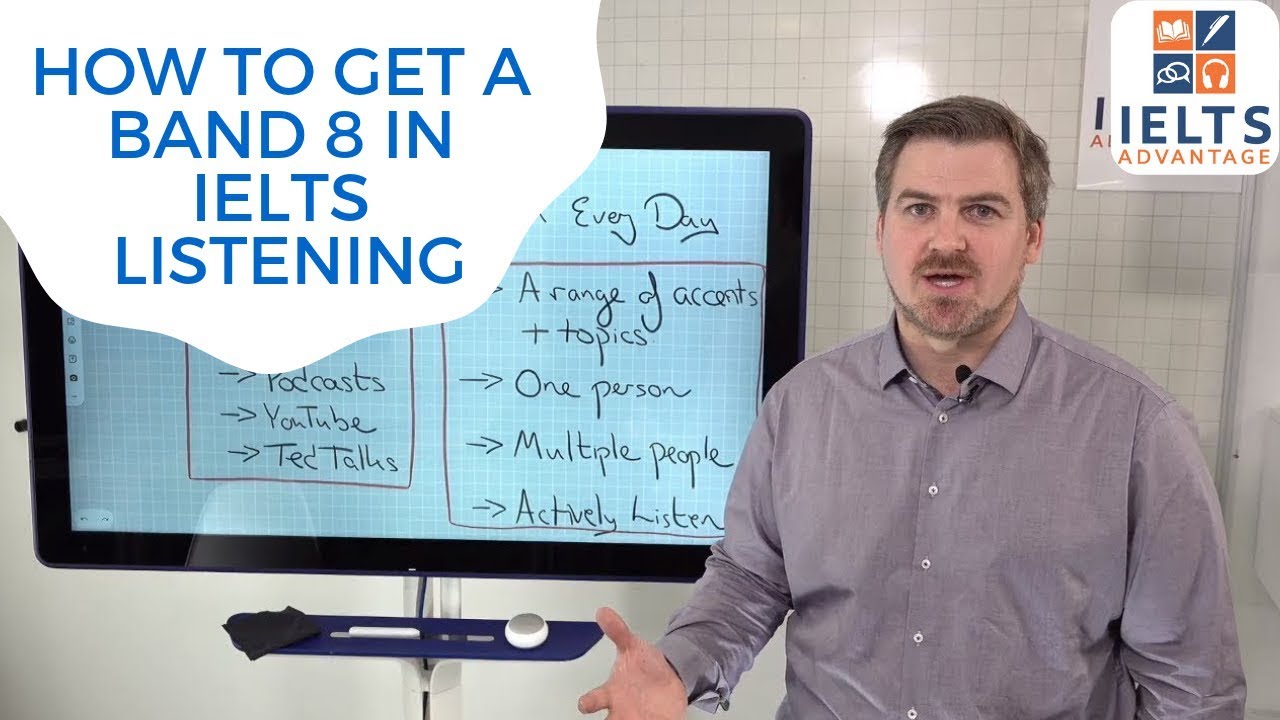How to Stay Focused in the IELTS Listening Test
Summary
TLDRIn this video, Chris from IELTS Advantage discusses key strategies to improve focus during the IELTS listening test. He emphasizes four main areas: health, preparation, stress management, and practice. Chris shares how maintaining good health through proper diet, exercise, and sleep enhances focus. He advises understanding question types to avoid surprises and reduce test-day stress. Stress is natural, but preparation can significantly reduce it. Finally, Chris highlights the importance of consistent, active listening practice to improve performance. He also provides resources for further IELTS preparation on his website.
Takeaways
- 😀 Health is crucial for focus during the IELTS listening test. A healthy diet, regular exercise, and sufficient sleep can improve performance.
- 💪 Students who are healthy perform better and are more focused during the test.
- 🍏 Small changes like eating healthy meals and getting 8 hours of sleep before the test can significantly improve scores.
- 📝 Preparation is key. Familiarity with different question types (e.g., summary completion, multiple choice) helps maintain focus during the test.
- 📚 Developing a step-by-step strategy for each question type can help reduce uncertainty and mental energy on test day.
- 😰 A little stress is beneficial during the test, but too much can overwhelm and hinder performance.
- 🧘♂️ Proper preparation reduces stress. The more practice tests students complete, the more confident they feel on test day.
- 🔄 Practice consistently over time, gradually increasing the duration of focused listening practice, just like training for a marathon.
- 🎯 Don’t book the test until consistently achieving the desired scores in practice tests. Magic won’t happen on test day without preparation.
- 🌍 Resources such as full lessons, strategies, and practice tests are available for free on the IELTS Advantage website.
Q & A
What are the four key elements discussed for maintaining focus during the IELTS listening test?
-The four key elements discussed are health, preparation, stress, and practice.
How does health impact performance on the IELTS listening test?
-Health impacts performance because students who maintain a healthy diet, exercise, and get enough sleep tend to focus better during the test. Poor health habits, such as lack of sleep or unhealthy eating, can lead to underperformance.
What are some short-term health recommendations for the day before the IELTS test?
-Short-term recommendations include eating a healthy dinner, having a nutritious breakfast, going for a walk, and getting at least eight hours of sleep the night before the test.
Why is preparation important for maintaining focus during the listening test?
-Preparation is important because being familiar with different types of IELTS questions and knowing how to approach them reduces panic and helps students stay focused. Proper preparation allows students to focus on the actual task rather than worrying about unfamiliar questions.
How can stress affect performance in the IELTS test?
-A little stress is natural and can help with focus, but too much stress can lead to overwhelm and make it difficult to concentrate. The key is reducing stress through preparation to avoid being overly anxious on test day.
What role does practice play in staying focused during the IELTS listening test?
-Practice helps students build the endurance needed to focus for the entire duration of the listening test. By gradually increasing the time spent on focused listening, students can improve their ability to stay attentive during the actual test.
Why should students avoid relying on luck or last-minute preparation?
-Relying on luck or last-minute preparation is ineffective because success in the IELTS test comes from consistent hard work and practice. Students need to be well-prepared in advance to achieve the scores they need.
How can students familiarize themselves with different types of IELTS listening questions?
-Students can familiarize themselves with different question types such as summary completion, multiple choice, form filling, and labeling maps by reviewing strategies and practicing these question formats in mock tests.
What is the recommended approach to dealing with stress during the IELTS test?
-The recommended approach is to reduce stress by being well-prepared. Students who have done enough practice tests know what to expect, which helps them stay calm and confident during the actual test.
Where can students find additional resources for IELTS listening practice and strategies?
-Students can visit the IELTS Advantage website, which offers free lessons, strategies for different question types, and practice tests. They can also contact the instructor for additional support if needed.
Outlines

Cette section est réservée aux utilisateurs payants. Améliorez votre compte pour accéder à cette section.
Améliorer maintenantMindmap

Cette section est réservée aux utilisateurs payants. Améliorez votre compte pour accéder à cette section.
Améliorer maintenantKeywords

Cette section est réservée aux utilisateurs payants. Améliorez votre compte pour accéder à cette section.
Améliorer maintenantHighlights

Cette section est réservée aux utilisateurs payants. Améliorez votre compte pour accéder à cette section.
Améliorer maintenantTranscripts

Cette section est réservée aux utilisateurs payants. Améliorez votre compte pour accéder à cette section.
Améliorer maintenantVoir Plus de Vidéos Connexes

How Do I Get a Band 9 in IELTS Listening?

How to get a Band 8 in IELTS listening

IELTS BAND 9.0 VOCABULARY | 54 words YOU NEED TO KNOW to pass the IELTS exam

IELTS Speaking Tips You MUST Know Before Your Test

IELTS VIP Podcast Episode 13: How Can I Improve my Fluency in the IELTS Speaking Test?

Most Band 9 Students Use These 20 Words
5.0 / 5 (0 votes)
